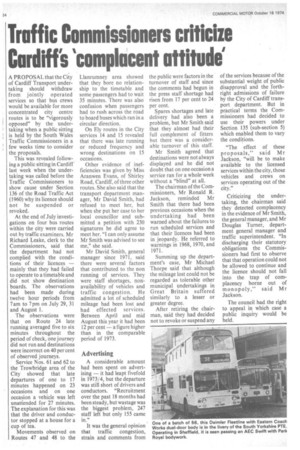Traffic Commissioners criticize Cardiff's 'complacent attitude'
Page 26

If you've noticed an error in this article please click here to report it so we can fix it.
A PROPOSAL that the City of Cardiff Transport undertaking should withdraw from jointly operated services so that bus crews would be available for more concentrated city centre routes is to be "vigorously opposed" by the undertaking when a public sitting is held by the South Wales Traffic Commissioners in a few weeks time to consider the proposals.
This was revealed following a public sitting in Cardiff last week when the undertaking was called before the Traffic Commissioners to show cause under Section 136 of the Road Traffic Act (1960) why its licence should not be suspended or revoked.
At the end of July investigations on four bus routes within the city were carried out by traffic examiners. Mr Richard Leake, clerk to the Commissioners, said that the department had not complied with the conditions of their licences — mainly that they had failed to operate to a timetable and did not show destination boards. The observations had been made during twelve hour periods from 7am to 7 pm on July 29, 31 and August 1.
The observations were that on Route 24 late running averaged five to six minutes throughout the period of check, one journey did not run and destinations were incorrect on 40 per cent of observed journeys.
Service Nos. 61 and 62 to the Trowbridge area of the City showed that late departures of one to 17 minutes happened on 23 occasions and on one occasion a vehicle was left unattended for 27 minutes. The explanation for thiswas that the driver and conductor stopped at a house for a cup of tea.
Movements observed on Routes 47 and 48 to the Llanrumney area showed that they bore no relationship to the timetable and some passengers had to wait 35 minutes. There was also confusion when passengers had to rush across the road to board buses which ran in a circular direction.
On Ely routes in the City services 14 and 15 revealed that there was late running or reduced frequency and wrong destinations on 15 occasions.
Other evidence of inefficiencies was given by Miss Aranwen Evans, of Shirley Road, Cardiff, of three other routes. She also said that the transport department manager, Mr David Smith, had refused to meet her, but when she put her case to her local councillor and submitted a petition with 230 signatures he did agree to meet her. "I can only assume Mr Smith was advised to see me," she said.
Mr David Smith, general manager since 1971, said there were several factors that contributed to the non running of services. They were staff shortages, non availability of vehicles and traffic congestion. He admitted a lot of scheduled mileage had been lost and had effected services. Between April and mid August this year it had been 12 per cent — a figure higher than in the comparable period of 1973.
Advertising
A considerable amount had been spent on advertising — it had leapt fivefold in 1973/4, but the departure was still short of drivers and conductors. "Recruitment over the past 18 months had been steady, but wastage was the biggest problem, 247 staff left but only 155 came in."
It was the general opinion that traffic congestion, strain and comments from the public were factors in the turnover of staff and since the comments had begun in the press staff shortage had risen from 17 per cent to 24 per cent Spares shortages and late delivery had also been a problem, but Mr Smith said that they almost had their full complement of fitters but there was a considerable turnover of this staff.
Mr Smith agreed that destinations were not always displayed and he did not doubt that on one occasion a service ran for a whole week without a "blind" at all.
The chairman of the Commissioners, Mr Ronald R. Jackson, reminded Mr Smith that there had been previous occasions when the undertaking had been warned about the failures to run scheduled services and that their licences had been in jeopardy. He referred to warnings in 1968, 1970, and 1971.
Summing up the department's case, Mr Michael Thorpe said that although the mileage lost could not be regarded as tolerable other municipal undertakings in Great Britain suffered similarly to a lesser or greater degree.
After retiring the chairman, said they had decided not to revoke or suspend any of the services because of the substantial weight of public disapproval and the forthright admissions of failure by the City of Cardiff transport department. But in practical terms the Commissioners had decided to use their powers under Section 135 (sub-section 5) which enabled them to vary the conditions.
"The effect of these proposals," said Mr Jackson, "will be to make available to the licensed services within the city, those vehicles and crews on services operating out of the city."
Criticizing the undertaking, the chairman said they detected complacency in the evidence of Mr Smith, the general manager, and Mr Douglas Turner, department general manager and traffic superintendent. "In discharging their statutory obligations the Commissioners had first to observe that that operation could not be allowed to continue and the licence should not fall into the trap of complacency borne out of monopoly," said Mr Jackson.
The council had the right to appeal in which case a public inquiry would be held.




































































































